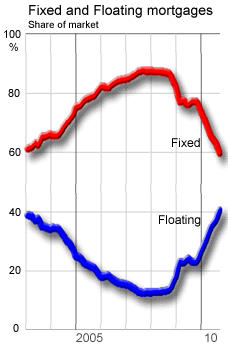 SBS Bank has raised its three and five year fixed mortgage rates by 5 and 19 basis points (bps), respectively. SBS's new three year rate is now 7.55%, while its new five year rate is 8.59%.
(Update 1 with charts.) See and compare all mortgage rates on our mortgage rates page.
Longer term fixed mortgage rates have been rising over the last few weeks as borrowers begin to eye moving back to fixed rates from currently discounted variable rates. Westpac economists this week said borrowers should "seriously consider fixing now".
However, BNZ Chief Economist Tony Alexander said the incentive for customers to leap into fixed from floating is being reduced by the discounted floating rates, as opposed to what happened in March when borrowers jumped on low long term fixed rates.
Here's what the Westpac economists said in their Weekly Commentary:
SBS Bank has raised its three and five year fixed mortgage rates by 5 and 19 basis points (bps), respectively. SBS's new three year rate is now 7.55%, while its new five year rate is 8.59%.
(Update 1 with charts.) See and compare all mortgage rates on our mortgage rates page.
Longer term fixed mortgage rates have been rising over the last few weeks as borrowers begin to eye moving back to fixed rates from currently discounted variable rates. Westpac economists this week said borrowers should "seriously consider fixing now".
However, BNZ Chief Economist Tony Alexander said the incentive for customers to leap into fixed from floating is being reduced by the discounted floating rates, as opposed to what happened in March when borrowers jumped on low long term fixed rates.
Here's what the Westpac economists said in their Weekly Commentary:
In the last couple of months we have seen borrowers gradually moving out of floating rates and returning to short-term fixed rates. These rates are the most favourable on offer, and will remain so for some time. But they're unlikely to remain at current levels once we see a more substantial shift by borrowers into these terms "“ in the same way that the extremely low long-term rates available prior to March didn't last for long once borrowers actually started taking them up. Borrowers should seriously consider fixing now, bearing in mind that they can reduce uncertainty about future cash flows by choosing a lower interest rate today and repaying more than the minimum amount.Alexander said in his regular column on Stuff that floating rates "probably won't rise until the middle of next year".
Personally speaking I am a strong advocate of fixing one's mortgage interest rates. But the jump from floating to fixing has now become so large that one now may as well opt for a floating rate and hope that in two year's time world growth and inflation are not taking off. What one should do is use the next 6-9 months to pay off as much principal as possible before the floating rate starts rising, and budget for the current rates rising at least 3 percent by early 2012. Do not be caught out like the Americans who in 2003 stopped fixing their rates 30 years as their parents and grandparents had done and went floating at ridiculously low rates of 2 percent. They were caught out when those rates shot to 6 percent come the middle of 2006 and the whole downward spiral of the US housing market and the world's credit markets got fully into swing.

We welcome your comments below. If you are not already registered, please register to comment
Remember we welcome robust, respectful and insightful debate. We don't welcome abusive or defamatory comments and will de-register those repeatedly making such comments. Our current comment policy is here.